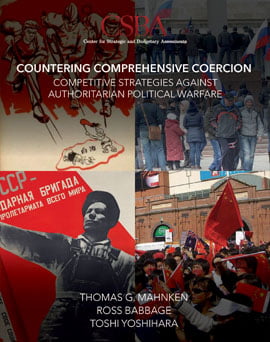By Robbin Laird
In a new study published by the Center for Strategic and Budgetary Assessments, the authors, Thomas Mahnken, Ross Babbage, and Toshi Yoshihara, look at the challenge posed by the authoritarian states in shaping coercive political strategies and how the liberal democracies might respond to them.
They conclude their study in terms of both the need to recognize the challenge and to respond to it.
“Authoritarian regimes in Beijing and Moscow have clearly committed themselves to far-ranging efforts at political warfare that hope to achieve the ability to comprehensively coerce the United States and its allies.
“Only by clearly and frankly acknowledging the problem and organizing the respective governments to respond do we stand a chance of defending fee societies from these sophisticated efforts at manipulating public opinion and the decision-making pace of elected officials and government policy makers.”
In their report, they provide overviews of both the Russian and Chinese approaches and provide good overviews of the approaches.
With regard to Putin, information warfare is a key element of both covering up Russian weaknesses and probing adversaries divisions. Putin came to maturity in the context of the Euromissile crisis and he is leveraging lessons learned in that period for the current one.
In contrast, the Chinese are leveraging significant global reach and investments to expand their ability to influence internal policies in the democratic societies. The Chinese have an economic card significantly greater than anything the Russians can put on the table.
Clearly, there is growing recognition of the Chinese threat, evidenced by books such as the Silent Revolution or by broader discussions of the challenge posed by China in Australia, as an example.
As Ross Babbage put it in an interview in my last visit to Australia with regard to the Australian situation:
Dr. Babbage sees growing recognition in both the United States and Australia about the nature of the challenges facing us.
“To respond is not simply about military capabilities; it is about whole of government capabilities and indeed whole of nation and whole of alliance capabilities.”
“And we need to have a much more open and frank discussion with our publics about the nature of the challenges we are facing.
I think the starting point is to share factual stories about what the Chinese and the Russians are actually doing both within their own societies and also within ours. “
In the report, the authors argued more generally that there is growing recognition of the threat posed by the Chinese approach.
“There are early signs that Beijing’s political warfare operations have awoken many decision-makers in the United States and its close allies to the nature and scale of the strategic challenge posed by China.”
The final chapter addresses recommendations for the United States and its allies.
At the heart of their analysis and their recommendation is simply to recognize the reality of the threat and the tools shaped to challenge cohesion and responses within the liberal democracies.
But how best to do so is a broad challenge indeed given the dynamics of change within the Western societies themselves.
Earlier this year, I visited the new Helsinki-based Center which is focused upon the challenges of information warfare and the various tool sets which authoritarian states are shaping and leveraging to compete with and expand their influence with the liberal democracies.
As I wrote after visiting the Centre of Excellence for Countering Hybrid Threats:
The work of the Centre is at the vortex of a key vector for liberal democracies, namely the evolution of these democracies under the influence of a 21st century information society and with non-liberal actors seeking to use the new instruments to influence the evolution of the democratic societies.
The underlying dynamic is change within the liberal democracies themselves.
Conflict has deepened, and the internet and associated means of communication have enhanced conflict rather than consensus within the liberal democracies.
President Trump has spoken frequently of “fake news” and although his critics condemn this phrase, we all know it exists and is a core challenge facing the liberal democracies.
It is the change associated with the new means of communication along with the evolution of a more differentiate and disaggregated society which provides the entry point for adversaries to conduct hybrid warfare in the information domain.
In other words, it is not about warfare per se; it is about the evolution of liberal democracies and the expanded tool sets which non-liberal actors have to seek to influence the culture, actions and decisions of the liberal democracies.
In the CSBA study the authors noted the historical example from the Reagan years of the launching of the Strategic Defense Initiative as in part information war.
“The SDI put in motion a chain of events that ultimately made the Soviet leadership aware that it could not compete with the United States in high-technology weaponry.”
I would add however that a relatively ignored piece of this story is the Farwell Affair where President Mitterrand reached out to President Reagan inspite of the ideological hostility of the US Administration to him and informed the President of the significant penetration of the Soviet Union within the highest levels of foreign governments and the US.
The Soviets were stealing US technology at levels even exceeding what the Chinese are now capable of doing.
And through the Farwell Affair, the Soviet operation was shut down and their confidence in what the US was doing in defense technology was dramatically reduced.
A good warning for our times and beyond that allies can help each other even if they have their differences in dealing with the challenges posed by the authoritarian societies.
Also a good reminder that authoritarian societies are never as powerful as they seem.


